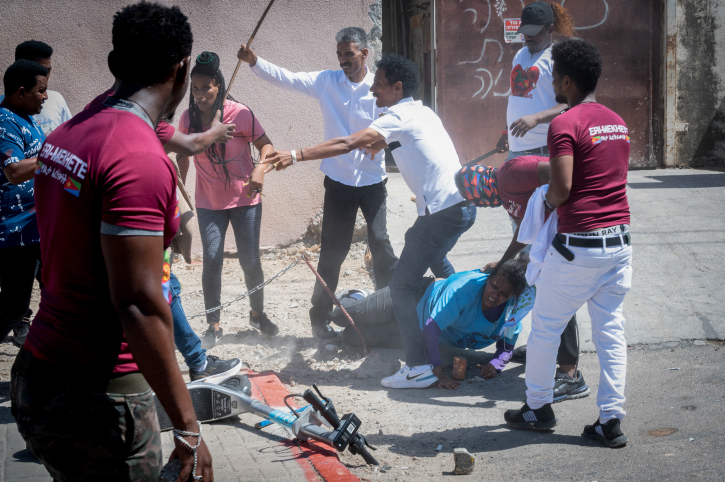
Severe clashes between the police and asylum seekers from Eritrea took place last Saturday during a demonstration in Tel Aviv opposite the Eritrean Embassy in South Tel Aviv. About 114 protesters were injured and evacuated to receive medical treatment. Groups of Eritreans clashed with sticks and stones while border police officers attempted to separate them with the help of helicopters above. In the middle of the demonstrations were crowds of women yelling at the men to calm down.
"During the event, live shooting was carried out by police officers who felt that their lives were in immediate danger,” the police said.
Following the district commander's assessment of the situation, it was decided to deploy hundreds of police officers in addition to the large forces of police and border police officers who were in the area at the time. Police used stun grenades and smoke grenades and arrested dozens of protesters.
District Commander Haim Bobalil said in a media briefing that the police had agreed to allow the demonstrations for and against the Eritrean government, with the different groups gathered in separate areas.
"Unfortunately, in the morning of the demonstrations, the parties did not agree to the conditions of the protest they were given,” he said in a media briefing. “Unfortunately, hundreds of government opponents arrived who made a decision that they were going to prevent the event of the government supporters at any cost. Around ten in the morning, they began breaking through the fences and confronting the police, beating them and throwing stones and fences. Right now the central aim is to separate the parties and make arrests. This is a conflict related to what is happening in Eritrea. We are doing everything we can to maintain order."
Ronni Gamzu, director of Ichilov Hospital in Tel Aviv, described a chaotic situation in the emergency room. “More than 40 injured people arrived at Ichilov's emergency room without prior communication, many of them self-arriving, many gunshot wounds, from several places in Tel Aviv. At first we prepared a small emergency room, but in light of the large and unexpected arrival, we later prepared a large emergency room and hundreds of staff members were called. We operated in six operating rooms at the same time. About 20% of the wounded were in serious condition, and all of them were treated,” he said.
“It was difficult for us to understand what was happening during the process,” he added. “We, the police, and border police, only realized the magnitude of the incident while treating the wounded. The wounded need to be separated to prevent violence between them. It was a very complex incident.”
The border police reported providing medical care to 114 wounded, including eight seriously injured, 13 moderately injured, and 93 lightly injured.
According to the demonstrators, the riots occurred mainly between opponents and supporters of the Eritrean regime. Eritrea has been ruled by President Isaias Afwerki since the country achieved independence in 1993. His People's Front for Democracy and Justice is the country’s only legal political party, and no elections have been held since he came to power.
One opponent of the regime told Davar, “We don't have a problem with the police, they protect us. This is not a conflict regarding Israelis.”
Tel Aviv Mayor Ron Huldai strongly condemned the clashes. "I support the police forces and the district commander who are in the field and are working to restore order,” he said. “I have instructed the municipal units to prepare with increased forces to provide assistance to the residents of the neighborhood where the violence is taking place."
The Prime Minister's Office said that it had instructed security forces to act to restore public order.
This article was translated from Hebrew by Noah Mirkin.






